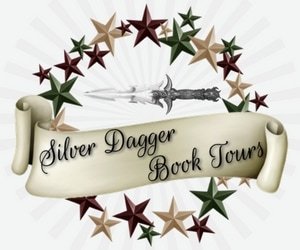Jamie Marchant's Blog, page 16
May 29, 2017
So You Want to Be a Writer
I was asked, “What made you want to become an author and do you feel it was the right decision?” The short answer to the question is that I was born a writer, and it was the only possible decision.
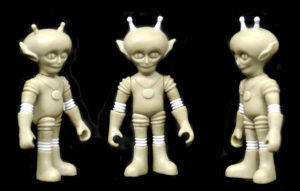 I never recall a time when my life goal was anything other than being a writer. When I was as young as six, I began writing stories about the man from Mars for my older sister. I continued to write throughout high school and had finished a novel before I graduated (not that it was any good). My parents, however, were practical people, and while they never told me that I couldn’t be a writer, they insisted I have a back-up plan. When I was looking into college majors, my only true consideration was how would this help me become a writer. I ended up as an English major, which allowed me to read a great deal of literature (every writer needs to first be a reader). Since a bachelor’s degree in English isn’t really an employable degree, I went on to get a Ph.D. in American literature.
I never recall a time when my life goal was anything other than being a writer. When I was as young as six, I began writing stories about the man from Mars for my older sister. I continued to write throughout high school and had finished a novel before I graduated (not that it was any good). My parents, however, were practical people, and while they never told me that I couldn’t be a writer, they insisted I have a back-up plan. When I was looking into college majors, my only true consideration was how would this help me become a writer. I ended up as an English major, which allowed me to read a great deal of literature (every writer needs to first be a reader). Since a bachelor’s degree in English isn’t really an employable degree, I went on to get a Ph.D. in American literature.
 In the process of attaining an advanced degree, I stopped writing fiction. I forgot that the Ph.D. and a university professorship was merely the back-up plan. I wrote the literary criticism that was necessary to advance myself in academia, and I was absolutely miserable. As I now tell my creative writing students, a writer has to write in order to be happy. I believe that being a writer, or an artist of any kind, is part of a person’s soul, and if that part isn’t nurtured, the soul withers.
In the process of attaining an advanced degree, I stopped writing fiction. I forgot that the Ph.D. and a university professorship was merely the back-up plan. I wrote the literary criticism that was necessary to advance myself in academia, and I was absolutely miserable. As I now tell my creative writing students, a writer has to write in order to be happy. I believe that being a writer, or an artist of any kind, is part of a person’s soul, and if that part isn’t nurtured, the soul withers.
One day in the midst of writing a piece of literary criticism, I realized why I was unhappy. My soul was starved. I threw away the partially complete literary article and began my first novel instead.
While my lack of literary publications and my writing of fantasy fiction, which is not highly regarded in academia, has stopped me from advancing to a full professorship, I have never regretted this decision. My soul is no longer withering.
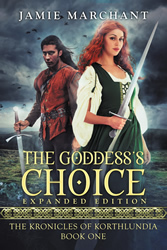 Of course, I want as many people as possible to read my books, but even if they were never read by anyone but me, writing them was the only possible decision for me to live a fulfilled life. Writing makes me happy. Writing feeds my soul.
Of course, I want as many people as possible to read my books, but even if they were never read by anyone but me, writing them was the only possible decision for me to live a fulfilled life. Writing makes me happy. Writing feeds my soul.
So if I have any advice for aspiring writers out there, it would be to remember that a writer has to write. Don’t let anything stop you even if the entire world tells you you’re wasting your time. Your soul knows better.
Are you a writer? Share what it was like for you in the comments.
May 26, 2017
Bossy Characters
I was asked whether I had any “side stories” about the characters is The Goddess’s Choice. A better question would be, did my characters have any stories about themselves that they insisted I write?
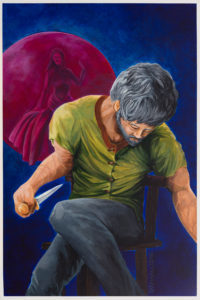 As every novelist knows, a well developed character is in some sense alive. This sounds weird to someone who is not a writer, but characters come to exist in a space of their own, which isn’t entire identical to the author’s imagination. These characters can become insistent, down right bossy, in letting an author know that there is more to their stories that needs telling. I had several of these bossy characters in The Goddess’s Choice, but the bossiest of them was Darhour, a former assassin. While some of my other characters were content with short stories of their own, Darhour insisted I write an entire novel about him.
As every novelist knows, a well developed character is in some sense alive. This sounds weird to someone who is not a writer, but characters come to exist in a space of their own, which isn’t entire identical to the author’s imagination. These characters can become insistent, down right bossy, in letting an author know that there is more to their stories that needs telling. I had several of these bossy characters in The Goddess’s Choice, but the bossiest of them was Darhour, a former assassin. While some of my other characters were content with short stories of their own, Darhour insisted I write an entire novel about him.
Darhour plays an important role in The Goddess’s Choice, but he is not one of the two major characters. We meet him as the Master of the King’s Horse who has a terribly scarred face and an especially fondness for the princess. Later, we learn that he was once the world’s most notorious assassin who has since taken a vow never to kill again. In The Goddess’s Choice, we learn some things about his past and why he feels such a strong attachment to the princess. But Darhour let me know in no uncertain terms that he was not content with what I’d told the world about him in this novel. He wouldn’t leave me alone until I had written a novel, which both tells his story after the end of The Goddess’s Choice and relates his past so that the reader understands what turned a simple stable groom into a killer.
While a man whose killed more people than he can remember may not sound like a sympathetic character, Darhour knew that once readers fully knew his story, they would not judge him harshly. As one reviewer put it, “While he sounds like a ruthless, heartless character, after learning his story, I couldn’t help but really fall in love with him.”
So if The Goddess’s Choice piques your interest in the world’s most notorious assassin, know that in The Ghost in Exile you can find the rest of his story.
Have you created any bossy characters? Tell us about them in the comments. Or is there a minor character in a novel you wish the author would develop in a novel of her/his own?
May 25, 2017
The Man From Rome Blog Tour
Read about an exciting new paranormal thriller and enter to win a $15 Amazon gift card below.
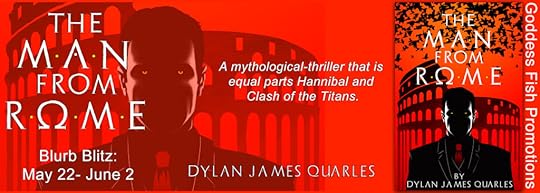
Rome is a city like no other, protected by a man like no other. He is the unnamed Immortal, the Man from Rome, and he is under attack.
An agent of his secret order has been murdered, her tongue ripped out, her throat coated in molten silver. The killing is meant to be a message, a warning that old enemies have resurfaced to punish the Man for the sins of his past.
Forced to retaliate, the Man sets in motion a sequence of events which pit an American thief, a Roman policewoman, and a fallen Olympian against one another in all-out war. The streets of Rome become a battleground where the supernatural clash with the mortal, and the Eternal City bears witness to yet another chapter in its storied history of violence.
Vengeance reigns supreme in this, the newest Novel from Dylan James Quarles.
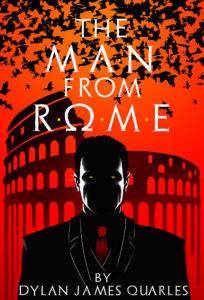
Excerpt
Light filtered in through the painters cloth, becoming diffused and shallow. As if in preparation for a slaughter, the floor was covered in newspaper, and the tables were draped with black plastic. Overhead, the light fixtures had been removed so that their wires dangled in stringy noose-like clumps.
Taking all of this in, Cato let the door swing shut behind him. The latch gave an audible click, and was instantly echoed by the snap of a Zippo lighter. Cato started with surprise and turned. In the far corner of the room, a candle had been lit, casting illumination upon a table laden with food. Already seated and waiting for him, a man in a three-piece chestnut suit smiled through the blue haze of his cigarette.
Cato blinked, and a pair of golden-eyes blinked back at him. Like memory made manifest, the Benefactor’s unmistakable face came into view. Cato gaped.
“But—but—you look—”
Tapping his cigarette into an ashtray, the Benefactor held up a hand for silence. Cato faltered and the words died in his throat.
“Before you finish that sentence,” spoke the Benefactor. “May I interject a simple request?”
Physically shaken by the timbre of the Man’s voice, Cato did all that he could just to nod.
“I can see that you are…disturbed by me, Cato—disturbed by what you see. Yet I beg of you, please refrain from uttering that which I have heard more times than I care to remember. Spare history the doom of repetition.”
About the author
 Arriving on the scene in 2012 with the publication of The Ruins Of Mars, Dylan James Quarles is one of Amazon’s brightest Kindle Authors.
Arriving on the scene in 2012 with the publication of The Ruins Of Mars, Dylan James Quarles is one of Amazon’s brightest Kindle Authors.
Using a his signature ability to make scenes come alive in your mind, Quarles immerses the reader in the world of his creation, adding layer upon layer until the narrative plays like a film. Further enriched by unique characters and breath-taking action sequences, his fiction is an ideal blend of entertainment and substance.
Quarles travels often, drawing inspiration for his work from Europe and South East Asia. His newest novel, The Man From Rome, is a direct product of his numerous visits to the Eternal City. Full of on-the-street detail, the novel packs an extra helping of Roman flare for the reader to enjoy!
Links:
Website – www.djqfiction.com
On Twitter – @dylanjquarles
On Facebook – @themanfromrome
The Man From Rome on Amazon – https://www.amazon.com/Man-Rome-Dylan-James-Quarles-ebook/dp/B06ZZHTXX1
May 24, 2017
Santana Young, Science Fiction Author
Welcome to today’s guest, Santana Young, Science Fiction Author Extraordinaire! It’s good to shake things up a bit sometimes.
 Santana young grew up watching science fiction and fantasy, her favorite being Babylon 5. She began writing at a young age for fun.
Santana young grew up watching science fiction and fantasy, her favorite being Babylon 5. She began writing at a young age for fun.
Santana currently lives in Southeast Ohio where she studies and recreates medieval history (Particularly, 13th-14th Century Mongol) as a member of the Society for Creative Anachronism (S.C.A.). She also enjoys painting, drawing, music, and playing games with friends.
Santana holds a B.A. in Anthropology with research interests in archaeology, cultural anthropology, and early forms of humans.
Interview
Tell us a little about yourself?
I live in Ohio with my husband where we like to do medieval recreation in the Society for Creative Anachronism (SCA). I have a B.A. in Anthropology and love studying other cultures and history. I love channeling the things I learn into my stories as analogs to create big complex worlds.
What made you want to become a writer?
My sister and I loved coming up with stories as kids. She started writing first, and like a typical little sibling, I followed suit. I continued to write over the years, but didn’t decide to publish until after my older sister published, and she encouraged me to share my work with others.
What are you reading at the moment? Would you recommend it to readers of this blog? Why?
I’m currently reading Chasing Ghosts, the third book in the Judah Black series by E.A. Copen. I definitely recommend this series. The Judah Black series is an urban fantasy that features uncommon monsters, complex plots, and a female protagonist that also is a single mother.
Tell us something about how you write? i.e. are you a plotter or a pantser? Do you have any weird or necessary writing habits or rituals?
I am definately a plotter. I’ve tried being a pantser, but I feel that my work is much more focused when I plot. I like plotting things out on Scrivener and mark them as scenes and sequels (an idea I got from Deborah Chester’s Fantasy Fiction Formula, a FANTASTIC read). I’m not super strict on it though. Sometimes in the process of writing, I feel something might need to go another way. I might think of a cool idea or a character will tell me. As long as I have a loose idea of where I’m going and major events.
I’m pretty flexible in my writing habits. I can write just about anywhere that I can take my laptop. I’ve written everywhere from coffee houses to in the back room of a recycling store. I like having something to sip on and maybe a snack on hand for when I pause to think. I can get into it enough that I’ll forget to eat or drink all day, and it’s a good way to make sure I’m getting something.
Could you tell us a bit about your most recent book?
In the Arena, Duncan’s mother died in an attack on the colony they lived on and his relationship with his dad becomes sour. So sour that his dad sells him as a gladiator to a colony that recreates the parts of Rome that people romanticize. He’s told he can gain freedom if he earns enough money but is gaining debt from food and medical expenses every day. He makes close allies and friends who become his new family, particularly Mahmud “Mom” Kartal who teaches him how to fight. But he also has to grow up fast learning hard lessons from the galaxy’s scummiest people.
Duncan learns a secret during his time in the Arena that his mom took to the grave with her. It shakes his world and makes him desperate to get free so he can find more answers, preferably trying to find a way to take his friends with him.
Despite the darkness in Duncan’s life, he’s a fairly light-hearted, smart-mouthed kid. He’s always pushing boundaries. Even when he’s about to give up on people, he finds hope in dark situations.
Tell us a little about your plans for the future. Do you have any other books in the works?
Yes. Book Two from the Chronicles of Everen Series, Liberator, I hope to have published later this fall. I’m almost finished with edits and hope to have betas reading it early next month. I’m also plotting and working on book three, Stigmata. There will be other books in the series, both as prequel series and side series, in the same universe. I also plan to do an Urban Fantasy series sometime later under the series title the League of Acquisitioneers. I also plan to write a book that will talk about how Anthropology can be used to develop cultures in science fiction and fantasy worldbuilding.
Where can we find you online?
Blog: http://authorsantanayoung.wixsite.com/home/blog-1
Website: http://authorsantanayoung.wixsite.com/home/
Facebook: https://www.facebook.com/AuthorSantanaYoung/
Twitter: https://twitter.com/_SantanaYoung_
Amazon: https://www.amazon.com/dp/B06WPB3K45
Barnes & Noble: http://www.barnesandnoble.com/w/the-arena-santana-young/1125983066?ean=2940154177969 (ebook)
http://www.barnesandnoble.com/w/the-arena-santana-young/1126069783?ean=9781544603940 (paperback)
Others: https://books2read.com/TheArena
Arena
 Earth is gone…
Earth is gone…
The galaxy is at war…
But Duncan Alexander Greyson has more important things to worry about.
After the death of his mother, Duncan’s dad sells him into slavery.
Now he must fight for his life in a space-age coliseum, trained to kill by the worst humankind has to offer. He’s promised freedom but only if he can claw his way out from ever-mounting debt.
When a secret his mother took to her grave comes to light, Duncan becomes more determined than ever. He’s leaving Neo Roma. Even if it’s in a body bag.
Excerpt
As a guard escorted him to a cage, Duncan’s skin prickled from all the eyes on him. They studied him, gleaning what they were able from his every move and appearance. They sized him up like lions looking over potential prey. Any one of those gladiators was a candidate for the man who would end Duncan’s brief life. Any one of those gladiators could make Duncan a murderer today.
Duncan’s enclosure was along the front wall. The row of metal cages reverberated when the door slammed shut behind him. The man who escorted him tapped on the display outside of Duncan’s cage and walked away.
Wei was to Duncan’s right. Al was in the one on the other side of Wei. To his left, a stranger stared forward, gripping a lance in his hand. Nobody in the other cages talked to anyone. Is the not talking thing an arena rule or an unspoken rule between gladiators?
He laid his weapons on the floor and slid up onto the stool provided. With no one to talk to, Duncan had to wrestle his nerves alone as he awaited his fate. After a majority of the cages were full, people dressed in suits and dresses entered. They browsed around the men in cages like a stroll at the zoo.
Who are these people? Why isn’t anyone explaining anything to me?
Duncan glanced to Wei. Duncan cleared his throat watching a couple with a young boy looking over one guy a few cells down. Wei sighed. He noticed Duncan’s confused eyes on him. Wei slid off his stool and motioned for Duncan to meet him by the bars. “What’s going on?” Duncan whispered.
“Pre-show, people can pay a fee to come in and take a look. Those screens outside our cells give them information about your wins, losses, and any significant fights. It also tells them what kind of style you use and your betting odds. Spooners like to check us out so they know which to bet on. It also gets them closer to their quote unquote heroes. This is your first chance to make a good impression so stop looking like a confused greenhorn.”
Wei tramped back over to his stool and sat down. He returned to the important task of brooding like the others. Duncan paced back to his stool as the couple with the kid approached. They stopped in front of Duncan’s cage. The man wore a sunflower dress shirt and green tie. He tapped on Duncan’s screen. Way to keep with the Roman atmosphere with that shirt, buddy, Duncan thought with an eye roll.
“A dimachaerus!” The chest-high kid pointed at the swords on the floor, vibrating with excitement. “Like the Ottoman!”
Well at least someone’s having fun, Duncan thought. He looked around at the other gladiators, each perched on their stools like brooding statues. A smile crept across Duncan’s face. I should get people to like me, right? Who likes a guy that looks like he’s got the attitude of an angry badger?
“The Ottoman trained me.” Duncan was bragging but he guessed spectators expected bravado from their heroes.
The boy smiled wide and hopped up and down. “He spoke to me!”
“That’s nice. Don’t talk back. He’s not supposed to talk to us.” The boy’s mother gave Duncan a warning expression.
It didn’t seem like she was scolding Duncan. It was more like she was trying to keep him out of trouble, like he’d broken a rule someone forgot to tell him. Duncan sighed. I guess the not talking thing is a rule. It would have been nice if someone told me.
He went back to his stool and sat slumping forward. He listened as the man read a few things about Alexander the Great. “It’s his first fight. Not good odds.”
The man moved along, the kid waving goodbye to Duncan as they went. Well at least I won someone over.
What do you think? Add your comments below.
May 23, 2017
The Bull Riding Witch Cover
Lou Harper has done it again and created an stunning cover for The Bull Riding Witch. I couldn’t be more pleased.
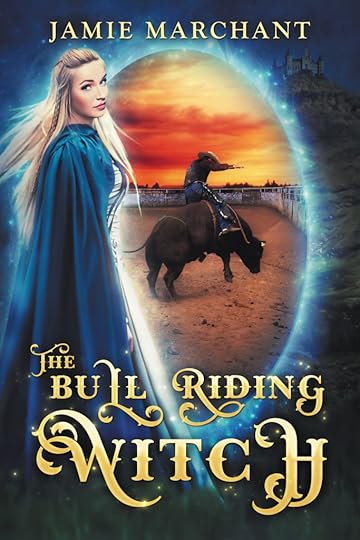
The novel will be released on July. Watch this space for more details.
May 22, 2017
Where did the Goddess Come from?
The expanded edition of The Goddess’s Choice will be released on June 15. To celebrate, let me tell you how it all began.
The Goddess’s Choice, expanded edition
Origin Story
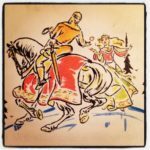 The Goddess’s Choice comes from deep within my childhood. My sister Jalane–she is ten years older than me–would tell me and my younger sister stories, fairy tales mostly: “Midas and His Golden Touch,” “The Three Little Men in the Forest,” “Hanzel and Gretel.” But my favorite was always “The Princess and the Glass Hill” or “The Glass Mountain” as my sister titled it. Wendie and I would have her tell that story over and over again. I was captivated by the bold hero on his magical horses of bronze, silver, and gold toiling up a mountain made of glass to win the princess’s hand.
The Goddess’s Choice comes from deep within my childhood. My sister Jalane–she is ten years older than me–would tell me and my younger sister stories, fairy tales mostly: “Midas and His Golden Touch,” “The Three Little Men in the Forest,” “Hanzel and Gretel.” But my favorite was always “The Princess and the Glass Hill” or “The Glass Mountain” as my sister titled it. Wendie and I would have her tell that story over and over again. I was captivated by the bold hero on his magical horses of bronze, silver, and gold toiling up a mountain made of glass to win the princess’s hand.
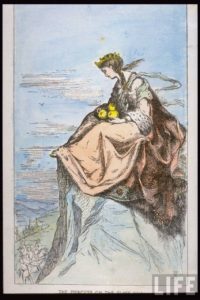 As I got older, the story faded from my consciousness. For years I hardly thought about it. Then in graduate school it came back to me in an essay I wrote. We were discussing children’s literature in a Women’s Studies course and had to do a personal essay on our experience with literature as a child. The story of “The Princess and the Glass Hill” figured heavily in that paper. That’s when the inherit sexism of the story was brought forcibly home. The princess has no name, no personality, performs almost no actions. She is not even described. She is nothing more than the prize–a trophy–to be handed off to the lucky man who wins her father’s contest. How she feels about the matter is not discussed, not even thought of, as I did not think about it when I was a child. I identified with the bold young hero of the tale, not the nearly invisible princess waiting at the top of the mountain with her golden apples.
As I got older, the story faded from my consciousness. For years I hardly thought about it. Then in graduate school it came back to me in an essay I wrote. We were discussing children’s literature in a Women’s Studies course and had to do a personal essay on our experience with literature as a child. The story of “The Princess and the Glass Hill” figured heavily in that paper. That’s when the inherit sexism of the story was brought forcibly home. The princess has no name, no personality, performs almost no actions. She is not even described. She is nothing more than the prize–a trophy–to be handed off to the lucky man who wins her father’s contest. How she feels about the matter is not discussed, not even thought of, as I did not think about it when I was a child. I identified with the bold young hero of the tale, not the nearly invisible princess waiting at the top of the mountain with her golden apples.
After graduate school, “The Glass Mountain” made another appearance when I had a child of my own. I loved the story so much as a child, I wanted to pass it on to my son. Jesse loved it every bit as much as I had.
 But one day after telling it to him, it came to me that the story could be so much more than the few pages and sparse details devoted to it in either the original or my sister’s version. Robbie (in my sister’s version, he was merely the youngest brother) was born sleeping in the attic on a straw mattress. Although that detail didn’t survive into the final version, it was the gem of the story. I also knew that my princess would be no passive character in the tale of another. The princess would be as strong and full developed as Robbie–a true heroine to match his hero. Samantha came to be, dreading yet another ball. She would far rather be riding her horse.
But one day after telling it to him, it came to me that the story could be so much more than the few pages and sparse details devoted to it in either the original or my sister’s version. Robbie (in my sister’s version, he was merely the youngest brother) was born sleeping in the attic on a straw mattress. Although that detail didn’t survive into the final version, it was the gem of the story. I also knew that my princess would be no passive character in the tale of another. The princess would be as strong and full developed as Robbie–a true heroine to match his hero. Samantha came to be, dreading yet another ball. She would far rather be riding her horse.
You can read the original fairy tale at The Princess and the Glass Hill. Jalane took a lot of license in telling her tales, so her version was more exciting than this one. Also, although the novel originated from a fairy tale, it is not a children’s story. It is definitely intended for adults.
May 19, 2017
Jamie’s Five Rules of Magic
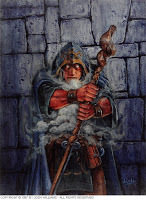 Magic is at the heart of fantasy, so it’s important for an author to get the magic right. You may argue that magic doesn’t exist. How can there be any “right” about it? Ironically, the very fact that it is imaginary makes its creation all that more problematic.
Magic is at the heart of fantasy, so it’s important for an author to get the magic right. You may argue that magic doesn’t exist. How can there be any “right” about it? Ironically, the very fact that it is imaginary makes its creation all that more problematic.In 1817, Samuel Taylor Coleridge first used the term the “willing suspension of disbelief” to discuss a reader’s ability to sacrifice realism and logic for the sake of enjoyment. When we write fantasy, this is exactly what we are asking readers to do. But readers are only willing to suspend their disbelief so far before they scoff at the absurdity of our story and become annoyed with us as authors. Everything in reality has rules, so readers will not accept magic without any. Magic that can solve any problem with no difficulties is not only unbelievable. It is boring. And being boring is pretty much an forgivable sin in a writer.
So if we are going to include magic in our fiction that readers will accept, there are some rules to keep in mind. (As with all writing rules, there are always exceptions, but you have to have a pretty good reason to break the laws of magic.) So here goes, Jamie’s rules of magic:
The Five Rules
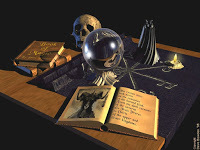 Rule #1: Magic must have limits. Magic must not be infinitely powerful. Otherwise, the story really has no point. The readers must know exactly what magic can and cannot do.
Rule #1: Magic must have limits. Magic must not be infinitely powerful. Otherwise, the story really has no point. The readers must know exactly what magic can and cannot do.If it can do everything, you will bore your reader.
Rule #2: Magic must have rules. The reader needs to understand how and why magic works, only that way can they suspend their disbelief and accept it.
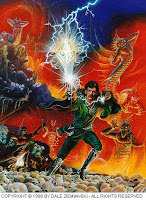
Rule #3: Magicalabilities need to be established long before they are necessary to get a character out of a bind. For example, my assassin Darhour has the ability to see in the dark. I introduce this ability to the reader early in The Goddess’s Choice when he goes to retrieve supplies from a store room. This is not at a moment of high tension in the novel. He could easily take a candle, but doesn’t need one. Therefore, when he later needs this ability to defeat another assassin sent after him, the reader can easily accept it, whereas they would scoff if the first time they heard about it was when the assassin attacks.
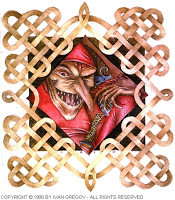 Rule #4. Magic must have costs. It can’t be too easy, or you will have readers rolling their eyes or slamming your book shut. My character Robrek is the strongest sorcerer Korthlundia has seen in hundreds of years, but it never comes easily for him. Even after a lot of training, he still finds himself blocked from the full strength of his talent. He learns that negative emotion hinders magic. He must forgive in order to access his full talent. (And he has a lot of things to forgive people for). Finally, even when he has succeeded in removing the obstacles that stand in his way, magic is exhausting. He can only work it for so long before collapsing. Magic is difficult and costs a lot. That is the only way magic is interesting.
Rule #4. Magic must have costs. It can’t be too easy, or you will have readers rolling their eyes or slamming your book shut. My character Robrek is the strongest sorcerer Korthlundia has seen in hundreds of years, but it never comes easily for him. Even after a lot of training, he still finds himself blocked from the full strength of his talent. He learns that negative emotion hinders magic. He must forgive in order to access his full talent. (And he has a lot of things to forgive people for). Finally, even when he has succeeded in removing the obstacles that stand in his way, magic is exhausting. He can only work it for so long before collapsing. Magic is difficult and costs a lot. That is the only way magic is interesting.

Rule #5: Magic must not be the point of the story. People are what are at the heart of any good tale, and any ability–magical or otherwise–is always only part of a person’s character. Don’t get so caught up in your magic you forget to tell a good story.
If you have any opinion on what makes magic work in fiction, please leave a comment below.
May 18, 2017
How to Write Fresh Dialogue
This week Cinthia Ritchie, author of Dolls Behaving Badly, gives us some hints on writing dialogue. Come back tomorrow for an excerpt from her work.
Back in graduate school, the worst insult a writer could inflict on another was that their dialogue was forced or stilted.
Bad writing was one thing. Bad dialogue, quite another. It insinuated that the writer had failed not only in his writing but also as a listener. It implied that you were hopelessly unaware or socially inept.
It was a double-whammy.
I wasn’t immune, of course, and I sat in the stilted dialogue “hot” seat more than once, cringing and shuffling my feet and wishing I had studied accounting or biology or one of those studious sounding subjects like psychics or chemistry.
Years later, I often think of those words as I’m writing dialogue, and they still make me cringe.
Because, face it, writing dialogue is hard. People in books don’t speak as people do in real life, since we don’t spend our days advancing the plot forward. We have no idea that we are part of a plot. Real life isn’t like that.
Writing is. And dialogue is the heavyweight of the story, sweating under the burden of multiple tasks: emphasizing character interaction, highlighting situations and moving the plot forward. It also controls the pace and tension. Every dialogued word holds double, and often triple, meaning. If it didn’t, it probably should be written as straight text.
But how does one write realistic dialogue?
First, listen to people talk. Very few of us speak in full and proper sentences.
Imagine writing this: “Andy, please set the table for dinner, and don’t forget the china plates my grandmother left me in her will.”
Well, there’s nothing inherently wrong with that sentence, but there’s nothing great about it, either.
Try this instead: “Andy, can you set the table, and don’t forget Gramma’s plates.” That’s more of how we speak in our real lives.
But wait! Didn’t I mention earlier than dialogue can’t reflect real life since it’s obligated to hold so many nuances?
I did, which is why I advise creating tension by inserting small slices of narrative within a body of dialogue (and the operative word here is small).
“Andy,” she growled, “please set the table, and don’t forget Gramma’s plates.”
Or, “Andy, please set the table,” Jane said, cradling her head in her hands. “And don’t forget Gramma’s plates.”
That still might not be great writing but it does do what dialogue is meant to do: Create enough tension to keep the reader guessing and ultimately, continue reading.
Other dialogue don’ts:
Using bad dialect or too much dialect/slang.
Using too many pause words such as “ums” or “you knows.”
Not breaking up dialogue with narrative (you know the heavy feeling you get when you open a book to find pages of unbroken dialogue? Don’t do to readers what you don’t want done to you).
Limit the use of “he said” and “she said.” Substitute with more active words: She yelled, he stuttered, she whined, he coaxed.
Dialogue dos:
Give each character a distinctive voice.
Keep dialogue fresh, fast and snappy.
Write from the characters’ hearts, not just their heads.
Keep the conflict alive by implying, not stating, the obvious and not-so-obvious
Of course, just as we sometimes say things we later regret, it’s inevitable that we will find ourselves, on rare or even numerous occasions, writing bad dialogue. When this happens, don’t beat yourself or your characters up. Apologize, make the proper amends, and move on.
Cinthia Ritchie is a former journalist who lives and runs mountains and marathons in Alaska. Her work can be found at New York Times Magazine, Sport Literate, Water-Stone Review, Under the Sun, Memoir, damselfly press, Slow Trains, 42opus, Evening Street Review and over 45 literary magazines.
Links:
Website: www.cinthiaritchie.com
Facebook: http://www.facebook.com/#!/cinthia.ritchie
Twitter: https://twitter.com/cinthiaritchie1
May 17, 2017
Will Macmillan Jones, Welsh Speculative Fiction Author
Welcome Will Macmillian Jones, a speculative fiction writer from the land of my ancestors (at least some of them), Wales, that is.

1. Tell us a little about yourself?
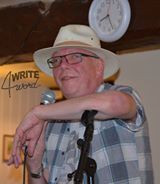 Hi Jamie, thanks for inviting me along to your blog. My name is Will, and I’m an authorholic (a term coined by a writing friend of mine M T McGuire–but she didn’t copyright it in time so I’ve nicked it. There’s a lesson for us all in there, isn’t there?). I’m a just sixty poet, novelist and oral story teller based in the Gwendraeth Valley, not far from the coast in West Wales. I do a lot of walking and draw a lot of inspiration from the myths, legends and countryside of this ancient land. When not writing speculative fiction, I’m a Consultant in International Taxation–so the two jobs are somewhat interchangeable. Should I have admitted to that? Oh dear. I was lucky enough to have had an English Lit. teacher at school who encouraged all his pupils to start writing, and I sort of forgot to stop. No that’s not quite true: I did stop for a long time after I got fed up of the rejection letters, and that is possibly one of the few things in life I regret. I really wish that one Stephen King had written his book–On Writing – many years before he actually got round to it. That would have possibly given me the encouragement to keep going at the time. Now I have a lot of ground to make up!
Hi Jamie, thanks for inviting me along to your blog. My name is Will, and I’m an authorholic (a term coined by a writing friend of mine M T McGuire–but she didn’t copyright it in time so I’ve nicked it. There’s a lesson for us all in there, isn’t there?). I’m a just sixty poet, novelist and oral story teller based in the Gwendraeth Valley, not far from the coast in West Wales. I do a lot of walking and draw a lot of inspiration from the myths, legends and countryside of this ancient land. When not writing speculative fiction, I’m a Consultant in International Taxation–so the two jobs are somewhat interchangeable. Should I have admitted to that? Oh dear. I was lucky enough to have had an English Lit. teacher at school who encouraged all his pupils to start writing, and I sort of forgot to stop. No that’s not quite true: I did stop for a long time after I got fed up of the rejection letters, and that is possibly one of the few things in life I regret. I really wish that one Stephen King had written his book–On Writing – many years before he actually got round to it. That would have possibly given me the encouragement to keep going at the time. Now I have a lot of ground to make up!
2. If you could have written any other book by any other author, what would it be, and why?
It would be Lord Of Light by the incomparable Roger Zelazny. His speculative fiction is simply masterful. The characters are so well drawn and believable, and his prose – well I think most of us would be very happy indeed if we could write with such easy skill. I understand that his Amber stories are being filmed right now – I hope that the film makers do him justice. GRRM cannot be looking forward to that coming out. Zelazny shows us all the true value of speculative fiction. It allows an author to hold a mirror to the world we inhabit, and through that mirror to distort, rearrange and examine us and our environment in new and interesting ways
3. Tell us something about how you write? i.e. are you a plotter or a pantser? Do you have any weird or necessary writing habits or rituals?
I’m a hybrid, I suppose. My humorous fantasy and the sci fi that I’m working on now tend to grow organically. I start with an idea, a concept or precept: wind up the characters and let them run. Very often I dream the next day’s writing sequence in the small hours of the night. My partner is used now to me crawling back into bed, freezing cold, at 3 or 4 am having just jotted down enough notes to make sure that I don’t forget my dreams. Luckily for me she is very tolerant… not of my cold feet though. I suppose everyone has their limits, don’t they? On the other hand the dark fantasy, or gothic horror, that I also write tends to be quite meticulously plotted. I will repeat that in capital letters METICULOUSLY PLOTTED in case either the publisher or my editor read this. They probably won’t believe it though, a tribulation that most of us speculative fiction writers have to suffer for our art.
4. What gives you inspiration for your books?
Funnily enough, my daughter was asking the same question recently. It isn’t an easy answer. About three years ago I was introduced to the ancient art form of oral story telling. It is a real skill, and I don’t pretend to be anywhere near as good as some of the tellers who live in West Wales. But learning the art from them encouraged me to read further back into Welsh Myth and the myths of other lands around the world. (Jamie’s note: I love Celtic mythology). I have found that the stories, at heart, are all universal, the themes of love, loss, hatred, revenge and greed. The art and skill of a novelist, poet, storyteller, is to look into the heart of these stories and then to weave the old stories around new characters and new settings, to show a new perspective on them and provide something that resonates with our times. And that, of course, applies to novelists too.
5. What was the hardest part of writing your book?
Marketing and selling it! Yes, I know, it is the most common complaint of all the authors we all talk to, isn’t it? How to sell the work? Some days it seems almost impossible to go online without being besieged – not by Orcs or deranged dwarves but by writers begging people to buy their latest offerings. Sometimes it’s kind of hard to tell the difference.
Of course, like everyone else I can get affected by times when the stories do not flow as smoothly as I would wish. To deal with that I have two strategies. Well, three if you include sitting under the desk and sulking, of course. Fortunately I do not resort to that too often. The first coping strategy is to be writing more than one thing at a time. Right now I have two files open on my word processor: the first is the sequel to the first sci fi novel, which will come out this summer. The second is the sixth and final book in the Gothic Horror series, The Mister Jones Mysteries. Very different works, written in entirely different voices and so providing me with some variety. Should one book stop on me, there is always the other calling… the second strategy is to go and write something totally different – Flash Fiction, or short stories with a maximum word count of no more than one thousand words. Some of those have won awards or competitions, and every one has provided me with some thoughts towards a new novel. I have around twelve novel outlines that have grown from these Flash Fiction stories, just waiting for my attention.
6. Titles have always been extremely difficult for me. How do you come up with yours?
Cheese! No, honestly. I eat a lot of cheese, especially in the evening. As a result I have some very odd dreams, and they frequently suggest book titles. (Jamie’s note: Now, I know the secret. I need to eat more cheese.) Titles are really important, in my view. They not only give a clue to the nature of the work (Love Amongst the Bulrushes for example, is unlikely to be a Slasher/Gorefest (unless your view of romance is somewhat cynical) and Gunfight at the Ranch is clearly going to appeal to those who love Westerns) but, unlike the two examples I have just quoted, should also attract and intrigue a potential buyer. I try to inject some humour into the titles too where possible. I see clearly when I am standing behind a display of my work at book fairs or conventions, that the first fantasy titles to be picked up are always The SatNav of Doom and The Vampire Mechanic . I spend a lot of time road testing titles too, asking people what they think will or will not work. I have a YA novel coming along about two teenagers who get sucked into a magical world through a painting. Initially this was to be called ‘The Rembrandt House’, but this didn’t attract the audience I talked to. Changing the title to ‘The Death Boat’ however did get the reaction that I was looking for and that will be the title on release..
Tell us a little about your plans for the future. Do you have any other books in the works?
Oh yes. As I said earlier, I am in the middle of the sixth and final in the Gothic Horror series, the fifth volume will be released very soon – I just have to work on some matters with my editor first.. After that, I have plans to write a number of stand alone Gothic horror/ paranormal works, and am already playing around idly with some concepts. I have the sci fi series that will keep me busy, the YA fantasy adventure and of course, the eighth in The Banned Underground collection needs to be finished off. I’m actually waiting until the collection of random jokes and gags has reached a reasonable level before cracking on with that one. Possibly a summer project. I also have The Last Viking to complete – a straight romance or general fiction novel. So many books to write, so little time…
Where can we find you online?
Blog: www.willmacmillanjones.wordpress.com
Website: www.willmacmillanjones.com
www.thebannedunderground.com
Facebook: https://www.facebook.com/william.macmillanjones
Twitter: @macmillanjones
Amazon: https://www.amazon.com/Will-Macmillan-Jones
Barnes & Noble: http://www.barnesandnoble.com/s/will%20macmillan%20jones
The House Next Door
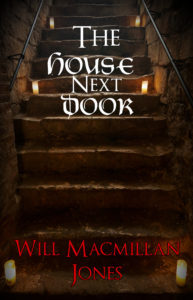 Mister Jones thought he had finished with the supernatural world – but the supernatural hadn’t finished with him…
Mister Jones thought he had finished with the supernatural world – but the supernatural hadn’t finished with him…
When Sheila Balsam finds herself compelled to buy a genuine antique in a strange little shop, she didn’t bargain for what came with the statuette – and Mister Jones finds himself once again drawn into the dangerous world of the paranormal : this time via the house next door.
An ancient evil has found a way to break from his enchanted prison and the only one who is going to stand in his way is the unfortunate Mister Jones, who seems destined to live in interesting times.
The House Next Door is the third in the highly regarded ‘Mister Jones’ collection of paranormal mysteries.
The Wizard Killer Book Tour & Giveaway
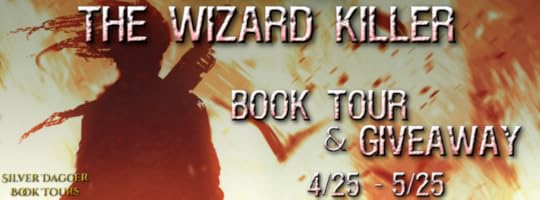

The Wizard Killer
Season 1
by Adam Dreece
Genre: Post-Apocalyptic, Fantasy

“Harry Potter meets Die Hard” – M. Bybee, WereBook.org
“Madmax meets Lord of the Rings” – Goodreads.com
A world once at the height of magical technology and social order has
collapsed. How and why are the least of the wizard killer’s
worries.
Leaning my bloody head against the back of the crashed levitating carriage, I
flex my cramped fingers. With a renewed grip on the mana-pistol, I
steal a quick breath. The others better wake up fast, otherwise we’re
all going to burn.
Written using a binge-TV show model, Season 1 contains 20 pulse-pounding
episodes, and is an all new side to best-selling YA author, Adam
Dreece.
“…an intense action movie-style romp through a wonderfully detailed
fantasy world. I freaking LOVED this story! I loved the cinematic
feel, I loved the action scenes, I loved the characters. It is like
Harry Potter meets Die Hard” — M Bybee, WereBooks.org, 5 Stars
“…imaginative and compelling series that is quite difficult to stop reading. Dreece
knows exactly how to build and then neatly tie up each episode, while
leaving the reader wanting more…. highly recommended.”
Reviewed by Jack Magnus for Readers’ Favorite, 5 Stars
Add to Goodreads
Amazon * Kobo * B&N * Apple * GooglePlay * Smashwords

The Wizard Killer
Season 2

Kill me with a floating city? You got my attention. But then steal from me
and try to burn me alive? You got me thinking.
I think I’m going to find your yigging, walking carcass and introduce
it to two friends of mine: pain and vengeance.
By the way, I borrowed a lightning rifle. Don’t worry, I’ll return
it… empty.
See you soon,
The Wizard Killer
Season Two kicks everything up a notch with 22 all-new, action-packed
episodes!
Add to Goodreads
Amazon * B&N * GooglePlay * Apple * Kobo * Smashwords

PREVIOUSLY
In Season 1 of The Wizard Killer, we met a man with no name as he awoke from the dead with his short-sword impaled in his chest, his magic failing, and his memories scrambled.
As he ventured into the barren wasteland trying to figure out what had happened to him, he narrowly avoided being burned alive by a carn and eaten by a family of ghouls.
A chance encounter with a trio of bandits revealed he was something called a weslek, some kind of living mana-battery. Fighting alongside them in a desperate battle against two flaming carnu, the nameless man drained the remaining life force from one of the dying bandits, and shot another. The battle won, their leader, a magic-wielding woman named Ania, took off, leaving the nameless man with the haunted feeling that their business wasn’t over.
And in the final moments of Season 1, the nameless man and a oner woman raced against time to escape the wrath of the raw devastation being wrought by a floating city. As the city passed over them, ripping every speck of life and mana from the surrounding area, the oner woman sacrificed herself for a chance to save the nameless man.
Episode 3 (Part 1 of a Flashback Scene)
“Hey!” yells a deep voice, followed by a hard shove.
I stumble backwards, disoriented, knocking over the chair I must have been in. I hit the wall and slump down. My head feels two sizes too small. Where am I? Why’s my heart racing?
The smell of stale and rancid beer immediately assaults my nose, clearing some of the fog in my mind and waking me up.
Looking down at what’s on my hands, I’m distracted by the floor’s shiny, orange-and-brown sheen. Half my brain tells me the stuff on my hands feels like sandpaper; the other half, like dried snot.
My eyes go from the floor to my sleeve, and then to how I’m dressed. I’m wearing matching brown pants, vest, and long coat—all neatly pressed. On the uneven table in front of me sits a brown, bowl-shaped hat.
After a momentary debate of whether to rub my eyes, I decide against it and gaze about the rest of the bar, ignoring the figure standing beside me.
The tavern has ‘rock bottom’ written all over it. The dingy walls and bowing ceiling don’t do it any favors. There are a few high windows, though I suspect they’ve never been cleaned, and thankfully they’re keeping most of the morning light at bay.
The man standing beside me goes to flick my ear, and I slap his hand, glaring at him.
He clears his throat and glares back at me. He’s got a tall, stocky frame and a big, bushy beard that is dark brown with a white streak from lip to chin. In one of his meaty hands is a black bowl hat, his wiry hair showing that he’s been wearing it for a good part of the day already.
Under his dark long coat is a red-and-silver vest with the chain of a pocket watch showing. Most importantly, he’s got a two-bar, tin rectangle pinned on the outside of his coat and the scowl of authority to accompany it.
“Sheriff,” I say grudgingly.
His face relaxes a touch. “I’ve had to look all over town for you. You’ve almost missed your time to meet with the librarian, and if you miss this one, there ain’t going to be another. Now get up and get moving. She doesn’t stay in one place long. And if a Scourge patrol finds her? You’re going to be looking over both shoulders every minute of every day until you’re having a dirt nap.”
I put a hand out.
He reluctantly grabs it and hauls me to my feet. My head’s throbbing, and the empty beer mugs on the table tell me why. Rolling my other shoulder, it barks at me painfully.
“Mother of Mercy,” I say under my breath. I must have done something to it when I fell off my chair… or last night. All that remains of what happened is a vague hint, nothing more. I can’t remember walking into this place or drinking a thing. All the consequences and none of the fun, that’s no way to live.
“I know that look,” he grumbles, a disapproving smirk on his face. “When you strolled into town yesterday, I told you to stay away from the black beer. That stuff will knock the smile off a horse. I also told you not to play cards with the three sisters who run the place. From what I heard this morning, you’re lucky they left you with your dignity, never mind your clothes.”
I grimace as the shoulder pain subsides a bit. “I’ll keep that in mind.”
“Good. Now put some gloves on,” he says pointing at my bare hands.
I pull my sleeves up and stare at my arms. “Where are my tattoos?”
The sheriff raises an eyebrow. “I was talking about your hands.” He takes one of my hands and turns it sideways. There’s a blue line that runs along the edge, disappearing up my sleeve. I look at my other hand, it’s there too.
“Unlike most folk, I don’t care where you came from, and I care even less what horrible things happened to you to put that on you. I’m sure it’s why the librarian will meet with you, but I don’t want to know.”
He bends down and picks up a pair of gloves from under the table. “Put these on.” He then hands me my hat. “Keep your head down, and no one should notice the line at your neck.” He leans in. “You remember that much, don’t you?”
I nod and put the gloves and hat on.
“You all good?”
“Yeah,” I reply.
We step out of the bar and into the blinding, dusty outdoors. The sky’s got a familiar red haze to it. My fingers start rubbing together like they’re pulling on a fishing line with an unwilling memory on the end of it.
There’s about two dozen people walking about, all of them dressed up beyond what I’d expect for an outskirts town. Most of the women have shiny dresses and parasols, and most of the men long coats and hats. Either this place is rich in something, or it’s got a secret that some pay handsomely for.
Glancing about at the two-storey buildings and dirt-road nature of the town, knots start to form in my stomach. I’m not sure if I’m paranoid, or I remember something, but I’ve got a bad feeling about the place.
I nudge the sheriff and point at the red haze. “What’s that?”
He gives me a wide-eyed glare. “You stupid or something?”
I frown at him.
Leaning in, he whispers. “It ain’t smart to bring up the affairs of wizards and the like.”
I’m tempted to ask something else, but am interrupted by the image of a floating city being built. Mana leaks… it’s one of the things that can lead to this haze, I remember. Looking again, my stomach turns as I’m sure there’s something far worse going on than building a floating city.
“Come on, people’ll start staring,” he says, leading the way.
I keep my head tilted down as people walk by. “They’re building that pretty close to a town, aren’t they? I thought they were always paranoid about that type of thing.”
He gives me a sharp glare and gets right in my face, his hand resting atop the pistol on his hip. “I believe in upsetting the apple cart a bit every now and then. That’s why I’m helping you. There are things most unnatural happening, and they’ve got to stop. But I need you to understand; I ain’t going to risk my life or this town.”
I slowly nod. Everyone likes to be a little bit of a rebel.
“Wizards have eyes and ears everywhere. I’ve heard a man mention a certain one, and then out of nowhere appears a hot-headed acolyte with the powers of a god and trigger-happy soldiers with something to prove.” He pulls back and straightens his vest. “Now, shut up or I’ll shoot you. We clear?” He flashes a politician’s smile and starts moving.
Across the street’s a two-storey building with a sign reading General Store. There’s an old man, bald, staring at me.
I stare back. There’s something about him, like he’s a person standing among paintings, something that makes him more real than the rest.
Taking a step into the road, the sheriff immediately gets in front of me and shoves me back. “I think we’re having a communication problem.”
I point at the general store, but there’s no one there. “I thought I saw someone I know.”
“Doubt it,” he replies with a scoff.
I look first at the store’s door, which doesn’t look like it’s closing, and then around, but there’s no sign of him. The only thing out of place is a faint buzzing in my head. Strange. I can remember every detail of the man’s face. I swear I’ve seen him before… just not here.
Shaking it off, I follow the sheriff for a few blocks before tapping him on the shoulder.
He turns around, his face showing his frustration.
I raise a finger. “Do you hear that? There’s like— a clicking.”
He listens for a moment. “Might be coming from the trailer house,” he says gesturing at a long building coming up. “That’s where we have the levi-cars. A few horses, too. Sometimes those levis make funny noises when people are working on them.”
As we continue walking, I keep glancing about, unable to shake the feeling of being watched.
I perch my sweaty hands on my belt, feel something. Looking down, I see I’ve got an empty holster on one side. On the other, I’ve got an empty place for a knife. Yig, maybe there was something to that three sisters thing.
Finally, he stops and turns around, leaning towards the light-blue door of the white-washed two-storey building. Glancing around the main street, I’m sure that clicking sound is not coming from the levi’s place.
The sheriff takes his hat off and taps twice on the door with his knuckles. He listens for a second, then straightens up and puts his hat back on. “Go on in. You’ve got five minutes, and then you need to get out of here.”
I narrow my eyes at him, tempted to ask why.
He rolls his shoulders and scans the street, his hands resting on his pistols. Glancing at me, he’s got an anxious look in his eye. “Go on. Clock’s ticking.”
I start to push on the door and stop. “You hear it too, don’t you? It’s like… like hollow bone being hit on hollow bone.”
“Doesn’t matter. Scourge spies are going to know something’s up soon and I’m not going to have this town known as the place where the only free librarian died.”
My palms are sweaty, my heart’s racing. Something bad is about to happen. I just don’t know what.
Episode 4 – (2nd half of Flashback)
The sunlight from the door stops two feet into the room with no rhyme nor reason. Stepping into the room, I close the door and take my hat off.
I stand quietly, listening to the creak of the floorboards under me, waiting for my eyes to adjust. The room seems barren, except for a counter a few feet away.
“Gah… that sound.” I put a finger in my ear and give it a good shake.
A silhouette appears behind the empty counter. “These are dangerous times,” it says, the voice soft and melodic.
The head turns and I’m thrown off. It’s like staring at a star-filled night sky.
Swallowing nervously, I nod. “You’re the last of the free librarians I take it.”
There’s a scream outside, followed by another.
My hands twist my hat, and I stare at the door. “I’m…” I turn and face the librarian. “I’m told you’ll have an answer for me. Though, I hate to say it, I wasn’t told what the question was.”
“The answer is a yes. A wizard can be killed through means other than simply time and frailty of the body. There’s a High Acolyte who knows… in Banareal. He’s learned the secret experiments of his master, the Wizard of Banareal. The Wizard suspects him of treachery. It won’t be long before the High Acolyte is arrested and tortured.”
“Are we supposed to get him before he’s arrested? After?” I don’t even know what I’m talking about. Staring at the floor, an image comes to me. “Old man. Is he an old man?”
I can feel her staring at me; I’ve thrown her off.
“The High Acolyte will be alive for some time, though barely. The Wizard will experiment on him, to see if it’s possible to make an acolyte into a weslek.”
“So, we need to get him out?”
“The wards won’t allow him to leave the laboratory alive.”
I glare at the librarian. “How is this helpful?”
Several gunshots go off on the other side of the door. It’s followed by screeches and a wave of that bone-chattering sound.
“I must go,” says the librarian, pushing open a door at the back, the room filling with sunlight.
Wincing and turning away, I raise a hand. “If I follow what you’re saying, then we need to get him out of there. How do we do that?”
“Take his life from him then give it back. There are a few who can craft such magical weapons. You’ll need to be careful, and make it discreet.”
“Like one of the soldiers’ short swords?”
I wish she had an expression; I can’t tell if she’s agreeing or staring me like an idiot.
“We are out of time.” She exits and the back door closes, leaving me standing in the dark.
The screams outnumber the gunshots. There’s that clicking sound coming from everywhere, even above me somewhere.
I crack the door open a bit and look. The scene doesn’t make sense, people shooting at nothing and being ripped apart by nothing.
Without thinking, my hand goes into one of the long coat pockets and pulls out an orb. It’s maroon and sleek-looking, with a silver streak. Holding it up to my mouth, I mutter some words without thinking. The orb pulses.
“It’s the H. A. of Banareal that we need. He’s going to be taken soon, we have a limited window of time. Wards will stop us from taking him, so we need to suspend his life. We need to find someone who can put that kind of enchantment on a common item, like a short sword. Suspend his life; then we get him out of there.”
Leaning against the doorframe, sweat drips off my forehead. Bowing my head for a second, I recall someone warning me that the orb could suck the life out of you, but wow, I wasn’t ready for this. I feel like I’ve got the flu of the century.
I stroke the silver streak of the orb. It pulses once, and it’s done. I stuff it back in my pocket.
Alright, now I’ve got to get out of here.
Pulling the door open fully, I take in the gruesome scene. There are pieces of bodies everywhere.
Across the street, I see terrified people huddled together on the second-floor balcony. If this was a Scourge Patrol, they wouldn’t be safe up there, and I’ve known Scourge Patrols to be brutal but never to rip people apart like what I’m seeing.
I’m not taking any chances. I step out of the building, closing the door behind me. Glancing each way, I don’t see any fighting going on.
I give the orb a squeeze and toss it into the air. It falls, like a lump, to the ground.
I shuffle over and scoop it up. “Come on, you’re supposed to go.” Tossing it again, I glare angrily as it lands without dignity on the brown, dusty, main street.
Picking it up and shaking my head, I notice the sheriff’s body, one of his arms missing. A thought slips out from my foggy memories and I look around. “Whatever they’re doing that’s causing the red haze, there’s not enough mana in the air to activate the magic for the orb.” I glare at the ground. “What was I supposed to do?”
As if replying, the sheriff gives me the answer. “It needs more from me.”
Just then I catch sight of a blur in the wind, then two more. This isn’t what I needed.
I reach down and snatch one of sheriff’s long-barreled pistols. Spinning the chamber with the back of my hand, I see its got three hopes of me living loaded. It’s not much, but it might be enough to get me to more.
Scanning about, I notice that only the door to the general store is closed. Maybe people are holed up in there, or maybe it’s a front for something. Either way, it strikes me as a good place to go.
I make a dash for it, the clicking bone on bone sound erupting from everywhere. The people on the balcony start screaming and crying. They’ve probably watched and heard this play out a dozen times already; now they’re waiting for my torturous end. I hope to disappoint them.
Peeking over my shoulder, everything’s deformed and distorted, like I’m looking through warped glass.
“The wind spiders are all around you!” yells a woman from the balcony.
I’ve never heard of wind spiders.
Sliding to a stop in front of the general store, I turn and accidentally shoot blindly. Yig, down to two.
Holding the orb tightly up to my chest, I wait, my heart pounding. It feels like each thought of mine is fighting through a raging river to get heard, and the river’s growing.
My eyes dart about, waiting for the inevitable. Everything’s quiet.
I scream as something slashes my leg. Falling to the ground, I drop my pistol and put a hand over the bleeding wound. It’s like someone’s put warped mirrors all around me, making the whole world look weird.
I rub my blood hand on the orb. “That’s got to count for something,” I mutter.
The orb pulses twice as I get slashed again, this time from the left and right.
I feebly lob the orb into the air. My heart sinks as nothing happens, as it falls towards the ground. But then it turns, arcing up, and vanishes.
With renewed vigor, I grab the pistol and scramble backwards to the general store’s door. I bang on the door with one hand, and fire at a warped area. Nothing on either front.
I crane my head, looking up at the door, and bang hard again. Then I gasp, as something pierces my chest, pinning me to the door.
All I can get are short, shallow breaths. There’s blood seeping out of me.
Glancing about, I see there’s a slight purple in the air. Then I see it, in all its terrifying glory: the wind spider. It smells of death, and radiates sweaty heat.
I plunge the pistol into where I figure its mouth is and pull the trigger.
Yellow goo goes everywhere, and the other blurry images back off, at least for a moment.
The pistol tumbles out of my hand as it goes numb. I can’t breathe. My head hurts.
I close my eyes, waiting for the inevitable.

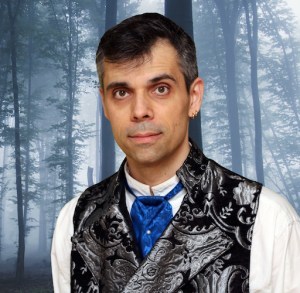
Adam Dreece kicked off his indie author career with his best-selling
steampunk meets fairy tale series, The Yellow Hoods, which struck a
chord with kids 9-15 and adults. After four books in the series, the
former software architect put out two more young adult books, the
post-apocalyptic fantasy book The Wizard Killer – Season One, and
then his science fiction novel, The Man of Cloud 9. The first two
novels in The Yellow Hoods series, as well as The Wizard Killer, have
been finalists for Book of the Year awards from the Independent
Author’s Network.
When he’s not working on his next book, Adam can be found giving talks
at schools, libraries, associations, as well as comic-con type events
like CalgaryExpo and FanExpoCanada on subjects from how to get one’s
ideas out and stepping outside of one’s comfort zone, to how to
give a successful book signing.
Along the way, Adam has faced many challenges, including working around his
Dyslexia (reading and writing disorder), and needing to be ruthless
with his time and energy in face of his severe asthma and chronic
abdominal scar pain. He’s become an inspiration to some, and a
symbol of tenacious hard work to others.
He lives in Calgary, Alberta, Canada with his wife and children. He is
an active online mentor at adamdreece.com, and is a busy public
speaker, panelist, and author in Canada and the Pacific Northwest.
Website * Newsletter * Facebook * Facebook
Author Page * Twitter Instagram * Youtube * Goodreads * Amazon

a Rafflecopter giveaway
